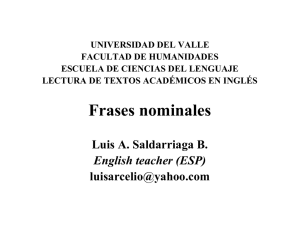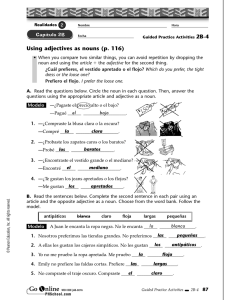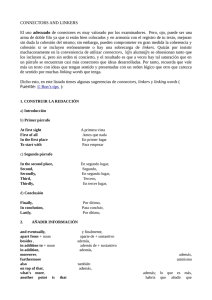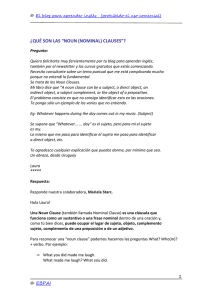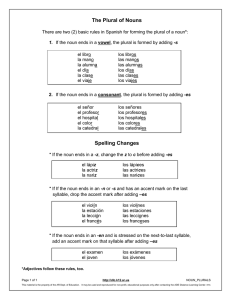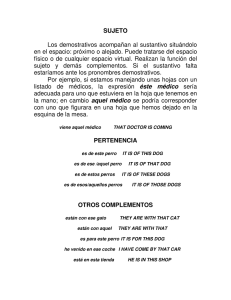Frases nominales - Arcelio´s Websites
Anuncio
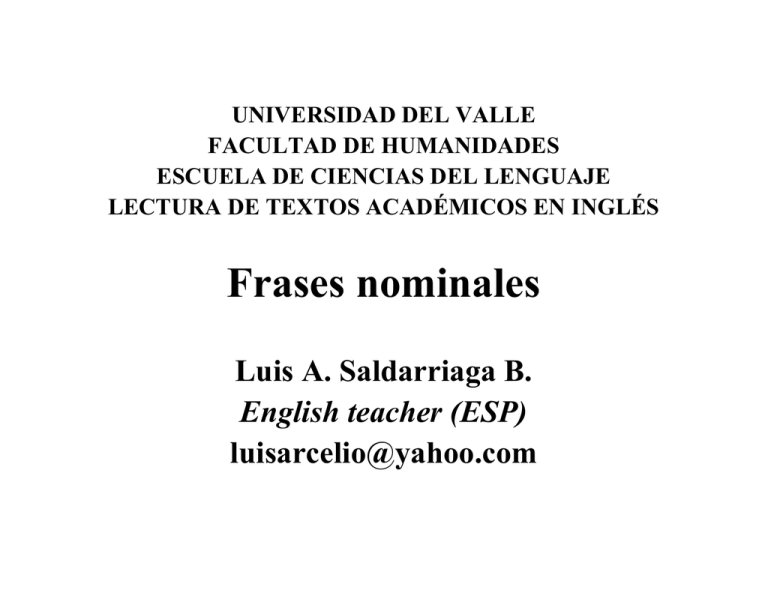
UNIVERSIDAD DEL VALLE FACULTAD DE HUMANIDADES ESCUELA DE CIENCIAS DEL LENGUAJE LECTURA DE TEXTOS ACADÉMICOS EN INGLÉS Frases nominales Luis A. Saldarriaga B. English teacher (ESP) [email protected] La oración compleja en inglés La oración compleja en inglés (the complex sentence) contiene al menos dos partes (clauses) que se conocen en español como proposiciones, una principal (main clause) y una subordinada (subordinate clause). La proposición subordinada puede funcionar en una oración como un sustantivo (proposición sustantiva), un adjetivo (proposición adjetiva), o un adverbio (proposición adverbial). Proposiciones sustantivas (I) Las proposiciones sustantivas (noun clauses) comienzan con la palabra que (that); o con un pronombre interrogativo, tal como por qué (why), qué (what), o cómo (how); y pueden funcionar en una oración como un sustantivo. – The spill of more than 10 million gallons of oil in Alaska caused what many people believe is one of the worst environmental disasters ever since. Proposiciones sustantivas (II) En este caso, la oración nos habla de que el derrame de más de 10 millones de galones de petróleo en Alaska causó “algo” (the spill of more than 10 million gallons of oil in Alaska caused what …). Ese “algo” (un sustantivo), el cual es introducido por la palabra que (what), resulta ser un desastre (uno de los peores desastres ambientales desde entonces, según piensan muchos). Proposiciones adjetivas (I) Las proposiciones adjetivas (adjective clauses), también conocidas como proposiciones de relativo; generalmente comienzan con un pronombre relativo, tal como quien (who), cuyo (whose), que (that), cual (which), donde (where), o cuando (when); y siguen inmediatamente al sustantivo o al pronombre que describen. – At the moment of the collision the third mate, who was not certified to take the tanker into those waters, was at the helm. Proposiciones adjetivas (II) En términos generales esta oración nos habla de que en el momento del choque, el tercer oficial estaba al timón (At the moment of the collision the third mate was at the helm). La proposición adjetiva, la cual es introducida por la palabra quien (who), nos aclara “algo” acerca de el tercer oficial, quien (él) no estaba certificado (autorizado) para dirigir el petrolero hacia esas aguas (the third mate, who was not certified to take the tanker into those waters). Frases nominales (noun phrases) • La frase nominal es el equivalente del sujeto (sintagma nominal) y como tal no lleva verbo. En inglés, una frase nominal (noun phrase) puede ser el sujeto (subject) o el objeto (object) de una oración. • Una frase nominal está compuesta por un sustantivo principal (head noun), también llamado núcleo; y sus modificadores (premodificadores y/o posmodificadores). Premodificadores • Los premodificadores pueden ser adjetivos (adjectives), los cuales califican al sustantivo; determinantes (determiners), que lo concretan (an article, a demonstrative word, a possessive adjective, a numeral, an ordinal number, or a quantifier); participios (past participles), que en este caso actúan como adjetivos; otros sustantivos, formas -ing (gerunds); o por varios de los elementos anteriores. Posmodificadores • Los posmodificadores pueden ser sintagmas preposicionales (prepositional phrases), proposiciones adjetivas (adjective clauses), grupos de palabras que comienzan con un participio pasivo (past participle clauses), o gerunds (en inglés). Estos últimos son claramente diferentes de los gerundios (en español) según veremos a continuación. Gerund vs Gerundio En inglés, el gerund se considera como un sustantivo que se forma a partir de un verbo: the singing of the birds. En español, el gerundio tiene una función verbal, adverbial o adjetival: cantando nunca es un sustantivo (excepto en una oración como esta). Los gerunds (en inglés) funcionan a veces como si fueran un pronombre relativo seguido por un verbo (that + verb). Esto nunca debe suceder con los gerundios (en español). Una frase (sintagma) nominal • La increíble y triste historia de la cándida Eréndira y de su abuela desalmada. La (determinante –artículo–) increíble (adjetivo) y (conjunción coordinante) triste (adjetivo) historia (sustantivo principal o núcleo) de (preposición) la (determinante –artículo–) cándida (adjetivo) Eréndira (sustantivo o nombre) y (conjunción coordinante) de (preposición) su (determinante –posesivo–) abuela (sustantivo) desalmada (adjetivo). Núcleo: historia (está antes de la preposición de). The complex sentence A complex sentence is usually made up by a main clause and a subordinate clause. The subordinate clause depends on the main clause for its meaning and may function as an adjective (adjective clause), a noun (noun clause), or an adverb (adverb clause). In this presentation about noun phrases, adjective clauses and noun clauses must be taken into account. Adjective clauses An adjective clause (also called a relative clause) begins with a relative pronoun (as, how, that, what, when, where, who, whose, why) and follows the noun or pronoun which it describes: • The doctor disapproved the antibiotic that another doctor prescribed me. • A doctor is a person who diagnoses and treats diseases and injuries. Noun clauses A noun clause begins with the word that or a question word (how, what, when, where, who, whose, why) and functions in a sentence as a noun: • The doctor said that the new treatment would improve my health. • What the doctor said makes me feel much better. Noun phrases A noun phrase is composed by a head noun and its modifiers: pre-modifiers and post-modifiers. Nouns can be pre-modified by a determiner, a past participle, an adjective, another noun, a gerund; or by several of the above elements. Usually the head noun is before a preposition such as at, between, by, for, from, in, of, off, on, over, to, with, etc; or a relative pronoun such as as, how, that, what, when, where, who, whose, why, etc. Determiners A determiner is a word that establishes and sets limits to a noun. It appears before any descriptive adjective and gives the context that a noun has. • A determiner can be an article (a, an, the), a demonstrative word (this, that, these, those), a possessive adjective (my, your, his, her, its, our, their), a numeral (one, two, three), an ordinal number (first, second), or a quantifier (any, some, many, much). Pre-modifiers • • • • • • • A completely wrong explanation. The succesful cloning of Dolly. The most ambitious medical project. The first human cloned embryo. Some genetically modified animals. The first succesful cloning attempt. Cell cycle co-ordination in embryo cloning. Adjective compounds • Adjective compounds are usually made up by two words (sometimes may be more) linked by a hyphen that works as an adjective. In this cases, they affect the noun that is immediately after them: • Cash-transfer problems. • Some short-term assets. • A specially-prepared clay. Post-modifiers I Nouns can be post-modified by: • An adjective (relative) clause: the various agencies that regulate public health. • A prepositional phrase: the standard technique for making transgenic animals. • A past participle clause: the first mammals cloned from cultured cells. Post-modifiers: adjective clauses Nouns can be post-modified by clauses of time, place, manner and reason: • This is the place where we work. • Those were the months when we worked the most. • That was the way as we used to work. • These are the reasons why we work here. The gerund A gerund is a noun formed from a verb. It has several grammatical functions: • Noun: A better understanding of the cloning problems. • Pre-modifier: Some major cloning problems. • Post-modifier: the problems affecting cloning. The gerund as a posmodifier In the some cases, it works as a relative pronoun plus a verb (that + verb): • The problems affecting cloning. • People living on less than $1 a day. These two noun phrases may be replaced by: – • The problems that affect cloning. – • People that live on less than $1 a day. Noun phrases (activity I) • The successful cloning of Dolly from a mammary-derived culture and the cloning of other lambs from cultured fibroblasts. • A researcher working under a high-power microscope. • Cultured cells originally derived from a nineday-old embryo. • Some less differentiated cells found in the mammary gland. Noun phrases (activity II) • A remarkable number of demographic transitions occurring everywhere. • The single most effective way to prevent disease in both rich and poor countries. • People in most developing countries who are dying not from infectious diseases but from the chronic conditions common among the aged. Noun phrases (activity III) • The increasing availability of antiretroviral drugs that are now provided at cost by some pharmaceutical companies. • The international, national and local infrastructures needed for optimal health for the majority of people on the planet. • The skyrocketing workplace-related deaths and injuries in developing countries.
